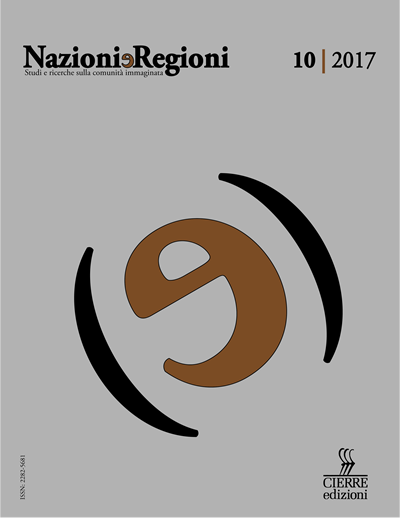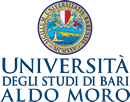Antoon Roosens e lo sviluppo del regionalismo e del nazionalismo di sinistra nelle Fiandre del dopoguerra: un itinerario politico e intellettuale (1958-2003)<br><br>Antoon Roosens and the post-war making of leftist regionalism and nationalism in Flanders: a political and intellectual itinerary (1958-2003)
DOI:
https://doi.org/10.15162/2282-5681/1449Parole chiave:
Antoon Roosens, Belgio, Fiandre, Gramsci, Marx, capitalismo monopolista, globalizzazione, Volksunie, Vlaams Blok, Masereelfonds, Belgium, Flanders, monopoly capitalism, globalization, Masereelfonds.Abstract
Antoon Roosens (1929-2003) è stato il più importante teorico del movimento regionalista e nazionalista fiammingo. Anche se ebbe accesso diretto a parecchie figure chiave della politica, non ricercò mai posizioni ufficiali e divenne celebre come capopopolo extraparlamentare, riuscendo all’inizio degli anni Sessanta a coordinare il maggior movimento di protesta della storia delle Fiandre del dopoguerra. Questo successo non si tradusse in un peso politico diretto, ma il suo concetto di federalismo progressista plasmò l’identità politica e la formazione discorsiva della Nuova Sinistra fiamminga. Negli anni Sessanta Roosens poteva essere considerato un regionalista, un federalista e un riformista radicale in campo economico. Dopo una breve fase nei circoli trotskisti e un lungo sabbatico in Italia e a Parigi, egli riemerse nel 1977 come figura guida dei movimenti sociali nazionalisti mobilitati contro la Volksunie e l’accettazione da parte di quest’ultima di una limitata riforma federalista dello Stato belga. Negli anni Ottanta, come presidente dell’organizzazione culturale post-comunista Masereelfonds, introdusse Gramsci tra gli intellettuali fiamminghi. Tuttavia, la sua interpretazione di Gramsci divergeva moltissimo dai principi teorici di quest’ultimo: egli più che altro inserì dei concetti gramsciani nella sua cornice nazionalista di sinistra, proclamando la necessità dell’indipendenza del Nord.
Antoon Roosens (1929-2003) was the most important post-war theoretician of the leftist regionalist and nationalist movement in Flanders. Although he had direct access to several key political figures, he never pursued a mandate and gained illustriousness as an extra-parliamentary bellwether, succeeding in coordinating the largest protest movement in the post-war Flemish history at the beginning of the 1960s. This success did not translate into direct political weight, but his notion of progressive federalism shaped the political identity and the discursive formation of the Flemish New Left. In the 1960s Roosens could be considered as a regionalist, federalist, and an economic radical reformist. After a short presence in Trotskyist circles and a longer sabbatical in Italy and Paris, in 1977 he reemerged as a leading figure of the nationalist social movements agitating against the Volksunie and its acceptance of a limited federalist reform of the Belgium state. As the chairman of the post-communist cultural organization Masereelfonds in the 1980s, he introduced Gramsci in Flanders’ intellectual sphere. However, his interpretation of Gramsci diverted enormously from the latter’s main theoretical tenets: he rather injected Gramscian concepts into his leftist nationalist framework, proclaiming the necessity of independence of the North.
Riferimenti bibliografici
Agosti A. (1996), Palmiro Togliatti, UTET, Torino.
Bologne M. (1978), «Les partis wallons de 1910 à 1975», Conference Paper, L’Histoire du mouvement wallon. Journée d’étude du 26 février 1976, Institut Jules Destrée, Charleroi.
Bologne M. (1979), De proletarische opstand van 1830 in België, Kritak, Leuven.
Cook B. A. (2002), Belgium: A History, Peter Lang, Bern.
De Batselier N. (1978), «Vijftig jaar later. Vlaams Socialistisch Kongre», Socialistische Standpunten, vol. 34, no. 2, p. 2.
Delwit P. (1999), «L’accueil mitigé des socialistes», in Coenen M.-T. – Govaert S., Le rassemblement des progressistes 1944-1976, De Boeck, Bruxelles, pp. 85-126.
Devolder C. (2003), «Een Belgische Sonderweg? De socio-politieke agenda van het ondernemingssyndicalisme (1937-1959)», Belgisch Tijdschrift voor Nieuwste Geschiedenis, vol. 33, n. 3-4, pp. 577-641.
De Wever B. (1994), Greep naar de macht. Vlaams-nationalisme en Nieuwe Orde. Het VNV 1933-1945, Lannoo, Tielt.
Dierickx G. (1978), «Ideological Opposition and Consociational Attitudes in the Belgian Parliament», Legislative Studies Quarterly, vol. 3, n. 1, pp. 135-158.
Dille K. (1999), «Een 1ste reactie », Aktief, vol. 24, n. 2, p. 2.
Huyse L. (1981), «Political conflict in bicultural Belgium», in Lijphart A. (ed.), Conflict and Coexistence in Belgium. The dynamics of a culturally divided society, Institute of International Studies, University of California, Berkeley, pp. 107-26.
Kossmann E. H. (1976), De Lage Landen 1780-1980: Twee eeuwen Nederland en België. Deel I: 1780-1914, Agon, Amsterdam.
Laridon L. (1996), Geschiedenis, rol en betekenis van het Vermeylenfonds, Laridon, Oostende.
Mort Subite (1990), Barsten in België: een geografie van de Belgische maatschappij, EPO, Berchem.
Meynen A. (2009), «Economic and Social Policy since the 1950s », in Witte E. – Meynen A. - Craeybeckx J. (eds.), Political History of Belgium: From 1830 Onwards, ASP, Antwerp, pp. 271-360.
Mommen A. (1982), De teloorgang van de Belgische bourgeoisie, Kritak, Leuven.
Mommen A. (1994), The Belgian Economy in the Twentieth Century, Routledge, London.
Roosens A. (1965), «Federalisme and arbeidersbeweging», Links, July 1965, pp. 5-6.
Roosens A. (1977), «Het Egmont-gemeenschapspact», Vlaams Marxistisch Tijdschrift, vol. 12, n. 1, pp. 26-34.
Roosens A. (1981), De Vlaamse kwestie: pamflet over een onbegrepen probleem, Kritak, Leuven.
Roosens A. (1983), «Antonio Gramsci en het nationalisme», Aktief, n. 7, pp. 2-5.
Roosens A. (1993a), «Vlaanderen, de Belgische staat en Europa», Vlaams Marxistisch Tijdschrift, vol. 27, n. 2, pp. 14-28.
Roosens A. (1993b), «Nationalisme en multinationaal kapitaal», Meervoud, mei 1993, pp. 10-14.
Roosens A. (1997a), « Gramsci over vrijheid en discipline », Meervoud, vol. V, maart 1997, pp. 18-23.
Roosens A. (1997b), «Het nationalisme in Vlaanderen: een historiek », Aktief, vol. 22, pp. 22-24.
Roosens A. (1999), «Links en de crisis van de Belgische staat», Meervoud, n. 6, pp. 14-6.
Roosens A. (2000a), «Vlaams Blok en Vlaamse Beweging», Vlaams Marxistisch Tijdschrift, vol. 34, n. 4, pp. 28-42.
Roosens A. (2000b), «Racisme en fascisme: bedenkingen bij een begripsverwarring», Meervoud, vol. 8, pp. 7-11.
Ruys M. (1975), De Vlamingen. Een volk in beweging, een natie in wording, Lannoo, Tielt.
Schwarzmantel J. (2015), The Routledge Guidebook to Gramsci’s Prison Notebooks, Routledge, London.
Simons L. (2013), Het boek in Vlaanderen sinds 1800: een cultuurgeschiedenis, Lannoo, Tielt.
Todt H. (1967), Hoop en wanhoop der Vlaamsgezinden. Deel II, Davidsfonds, Leuven.
Todt H. (1971), Hoop en wanhoop der Vlaamsgezinden. Deel III, Davidsfonds, Leuven.
Turf J. (1986), «Op zoek naar een Vlaams Progressief Alternatief», De Rode Vaan, n. 38, p. 1.
Vandewalle G. (1982), «De economische ontwikkeling in België 1945-1980», in Blok D.P. – Prevenier W. – Balthazar H. (eds.), Algemene Geschiedenis der Nederlanden. Volume 15, Fibula-Van Dishoeck, Haarlem, pp. 116-58.
Vandenabeele W. (1996), «Vijfentwintig jaar Masereelfonds», Aktief, vol. 21, p. 5.
Van Haegendoren M. (1983), Van taalstrijd tot staatsvorming, Davidsfonds, Leuven.
Van Looy P. (1982), De niet-partijpolitieke Vlaamse Beweging en de Egmont- en Stuyvenbergakkoorden, Tesi di laurea magistrale, Universiteit Gent.
Verrept S. (1957), «Jongvlaanderen en de wereldtentoonstelling», Het Pennoen, vol. VIII, n. 3, p. 7.
Versieren J. (2008), De politieke biografie van Antoon Roosens (1929-2003): tussen natie en klasse, Tesi di laurea magistrale, Universiteit Gent.
Versieren J. (2012), «Antoon Roosens : een enigmatisch publiek intellectueel», Aktief, n. 4, pp. 11-15.
Versieren J. (2014), «Het Demokratisch Aktiekomitee (1967-1968)», Brood & Rozen, vol. 19, n. 3, pp. 24-41.
Versieren J. – De Smet B. (2015), «The Passive Revolution of Spiritual Politics: Gramsci and Foucault on modernity, transition and religion», in Kreps D. (ed.), Gramsci and Foucault: A Reassessment, Ashgate, Farnham, pp. 111-130.
Wils L. (2001), «De stand van het onderzoek naar de Vlaamse beweging», Revue belge de philologie et d’histoire, vol. 79, n. 4, pp. 1283-1299.
Witte E. - Meynen A. (2006), «België in de sixties», in Witte, E. – Meynen, A. (eds.), De geschiedenis van België na 1945, Standaard, Antwerpen, pp. 98-104.
Witte E. – Van Velthoven H. (1998), Taal en politiek. De Belgische casus in een historisch perspectief, VUBPress, Brussel.
Downloads
Pubblicato
Fascicolo
Sezione
Licenza
Nazioni e regioni è una rivista open access che applica la licenza Creative Commons CC BY-NC-ND 4.0 a tutti i contenuti pubblicati.
Nazioni e regioni is an open-access journal that applies the Creative Commons CC BY-NC-ND 4.0 licence to all published contents.







